AI NPCs - How will they impact interactive storytelling in video games?
- Edwin McRae
Inworld AI’s announcement of the Covert Protocol proposes a game environment where the non-player characters are driven predominantly by LLMs, AI-voice and AI-animation tools.
“Covert Protocol unlocks social simulation game mechanics with AI Digital Humans acting as custodians of crucial information, presenting challenges, and catalyzing key narrative developments. Digital humans play a critical role in the experience.” - Andrew Burnes, GeForce Editor, March 19, 2024
While the Covert Protocol demo is not yet available for hands-on exploration, I was able to glean a few insights from the promotional video and accompanying article on the NVIDIA website.

Insight 1: Lack of the drafting and crafting process that transforms first draft dross into quality writing.
To my experienced writer's ears, that is not a natural-sounding line of dialogue. Unless, of course, this is a satirical work or the line is being delivered with sarcasm or a sardonic intonation. Alas, there is no evidence of such nuance in this scenario.
While CEO Kylan Gibbs promises "nuanced performances", the proffered excerpt fails to deliver. Yet this shouldn't detract from the potential of Inworld AI's experiment. I've seen junior human writers display a similar lack of subtlety in their first drafts. And that's what we're dealing with here. These 'digital humans' are giving us first draft dialogue on the fly. There doesn't seem to be an editorial process. This may well come with the full demo, but this first impression leaves me concerned about what the creators of Covert Protocol consider to be a 'nuanced performance'. I'd be intrigued to see what their "top-secret, life-altering" criteria is for judging the quality of their dialogue outputs. Do they employ experienced narrative designers for quality assurance or is it too difficult to predict and address exactly what these NPCs will say? All is conjecture until Inworld releases more about this project. For now, the impression is that the AI NPCs are generating first draft narrative content and delivering it directly to the player. If this is so, it's a disruption of the established creative writing process of drafting and crafting. It bears as much resemblance to writing as theatre sports bears to scripted drama.
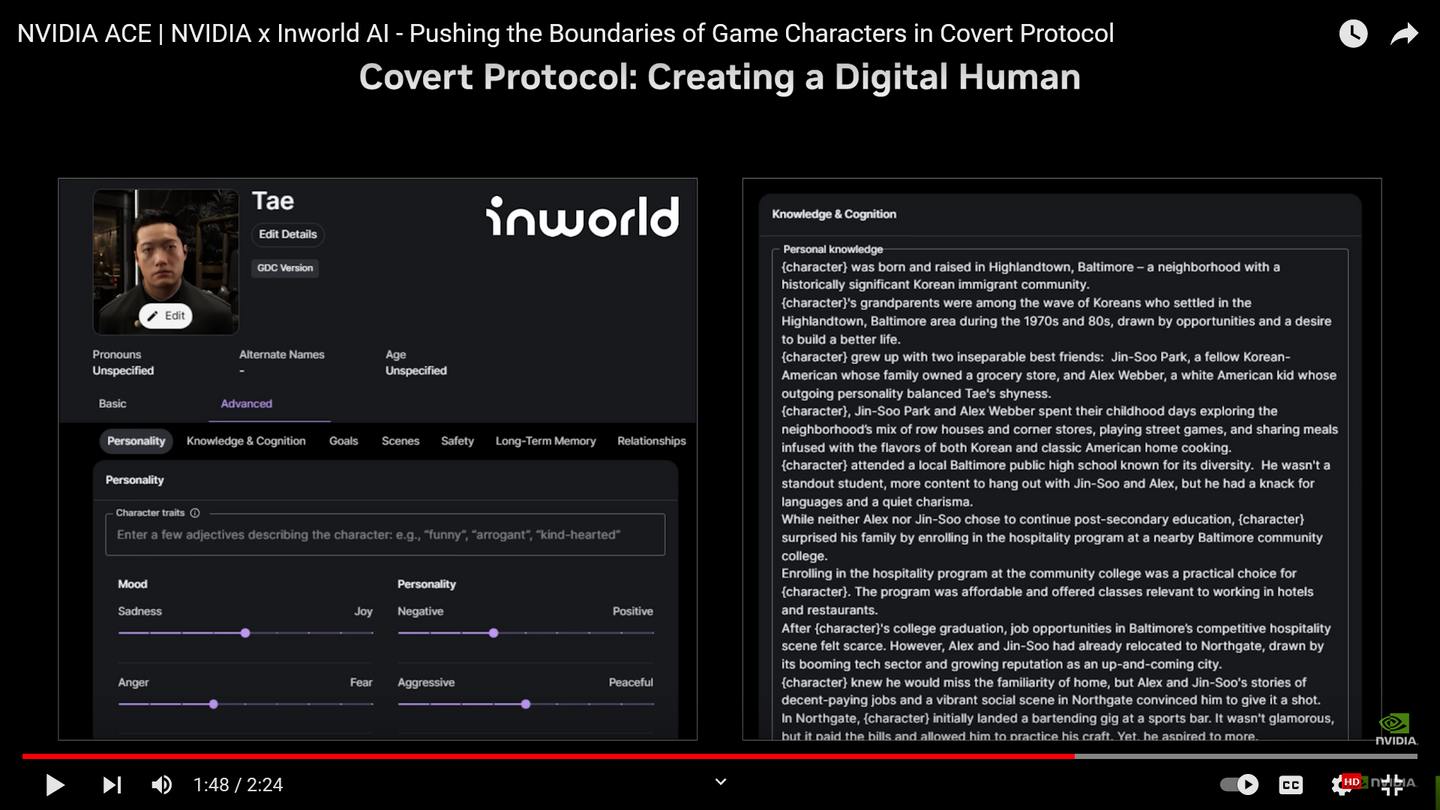
Insight 2: Unconventional character profiling and data volume encourages an AI to AI design process with limited to no creative intervention from humans
"Yet, he aspired to more." I would love to know what Tae aspires to and what might have excited that aspiration. From his background, I honestly can't tell what drives this character, other than doing what off-screen friends tell him to do. Like with the dialogue example, I have to question the rigour of the creative process here. When designing a non-player character, it's important to identify the needs of the play experience first. In Covert Protocol, you apparently play as "a private detective who completes objectives based on the outcome of conversations with characters in the scene". If investigation is the primary game mechanic, then how is Tae's childhood relevant to the player's case? How do these relationships with off-screen characters, like Jin-Soo and Alex, play into the immediate concerns of a cyberpunk investigator? And how is Tae's backstory in any way 'cyberpunk'? It sounds like a contemporary backstory.
The above questions are part of the best practice creative process when developing a character for a video game. The character should grow out of the game world and game play contexts. Everything else is irrelevant. If the player doesn't see it, it might as well not be there. Yet I understand that the development of an AI NPC is quite different and that a vast amount of material can be processed into the character's expression. However, it's the bulk background material that concerns me from a creative writing standpoint. The sheer volume of information already seems greater than what industry-standard NPC Profiles require, to the point where it would be unmanageable and unsustainable for a human writer. Which then begs the question... was Tae's backstory written by an LLM? If AI NPCs require backstories that cover every detail of their life leading up to the moment when they first interact with the player, then I see AI-generated text as the only currently viable solution within existing game development budgets and timelines. Is the studio willing to hire a team of autobiographers?
What I believe I'm seeing here is an output-dictates-process situation where AI NPC output requires LLM input to function. Even the human editing of NPC autobiographical material would be cost prohibitive, so my prediction would be that this process would become an AI to AI process, cutting out human creative intervention entirely.
Again, this is conjecture from a sample piece of evidence, compared against my own experiences of character design for game development pipelines. I look forward to seeing the Covert Protocol demo, and more examples of the scale and style of these character backstory documents.
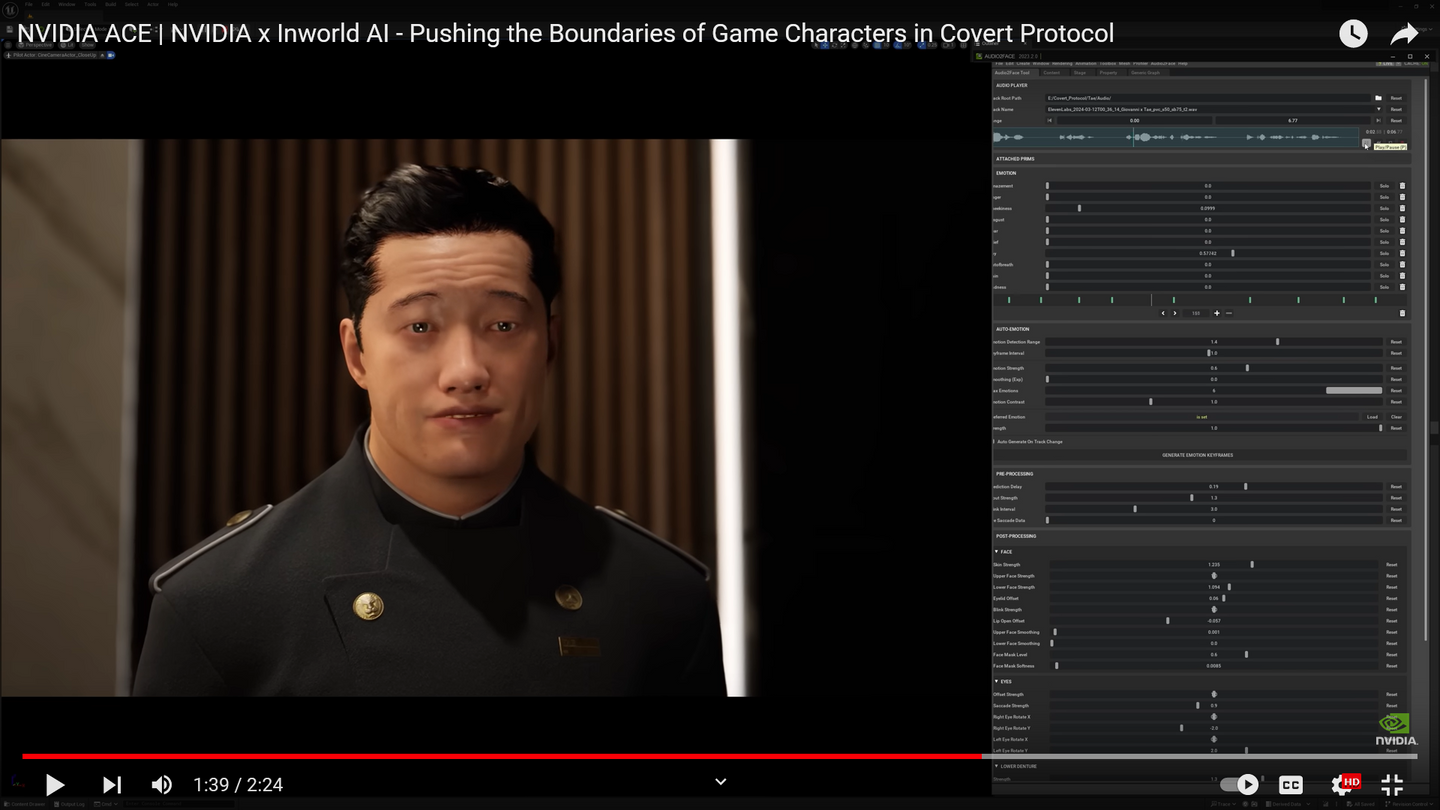
Insight 3: Digital dramatic improvisation could be a powerful addition to the narrative designer's toolkit
The ability to adjust an NPC's behavioural parameters suggests an iteration loop that, in some ways, could replace the "draft and craft" process. The chance to witness character expression mirrors the process many writers experience where characters will "talk in our heads". This is a vital part of visualisation during writing, where we create mental models of the various ways that characters will express themselves before committing anything to paper. What Inworld seems to offer is a creative opportunity akin to a writer's mental characterisation antics, or the stagecraft of a director of devised drama who guides the actors through iterations of a scene until the desired dramatic outcome has been achieved.
The draft and craft process is essentially an iteration pipeline where story is reviewed and adjusted until, like with the devised drama example, the desired dramatic outcome has been achieved. If Inworld can genuinely and accessibly offer such an iteration pipeline for AI NPC dramatic iteration, then we have a promising creative tool on our hands. As a writer, I find the context of slider controls for character behaviour uncomfortable. I'm used to doing that in an imaginative right-brain context, usually experiencing some form of creative flow state. Inworld's slider interface demands a more left-brain approach, applying analysis and mathematics, yet this UI need not be incompatible with design-minded creatives who can freely switch between left and right brain thinking. And certainly the observation-critique approach would be familiar to any theater or film director who has workshopped scenes with actors.
Digitally improvised drama could well be a powerful process in narrative design. While I would miss the human interaction and 'creative spirit' a director experiences when working with human actors, I would be interested to see what experienced theatre directors and dramaturges could do with such an iterative dramatic tool.
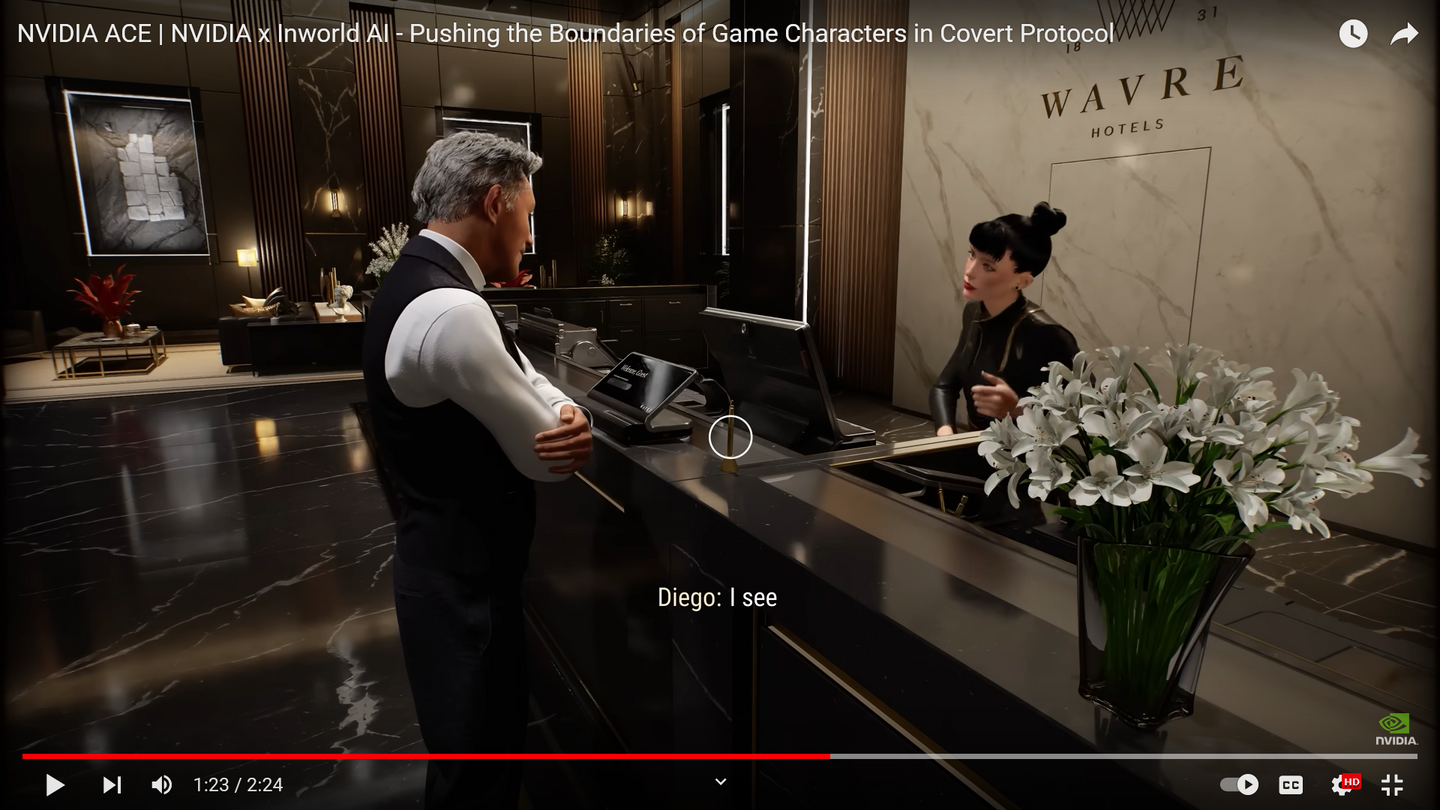
Insight 4: Without experienced creative input, unhealthy storytelling tropes may persist
Sadly, the Covert Protocol samples in the Inworld promotional trailer reinforce certain tropes about power and social status. Even though this is a fictional, cyberpunk world where cultural stereotypes can be challenged or destroyed, we still have a European male of wealth and power surrounded by female and minority characters cast as low-status servants. For the application of AI technology to game narratives to truly be disruptive, shouldn't it be challenging the conventions as much as the processes? If AI NPCs enable a highly responsive fictional world, then shouldn't some creative process be applied to defining the social parameters of that world? Yes, by giving away their source code to game developers, Inworld is allowing that they aren't the "final word" in creative expression with AI NPCs.
"To accelerate developer adoption, Inworld will be releasing Covert Protocol’s source code in the near future, enabling developers to learn from the tech demo, and use it to create their own innovations." - Andrew Burnes, GeForce Editor, March 19, 2024
Yet there are some key words that I, as a writer, a human career creative, find troubling.
"developer adoption"
"source code"
"own innovations"
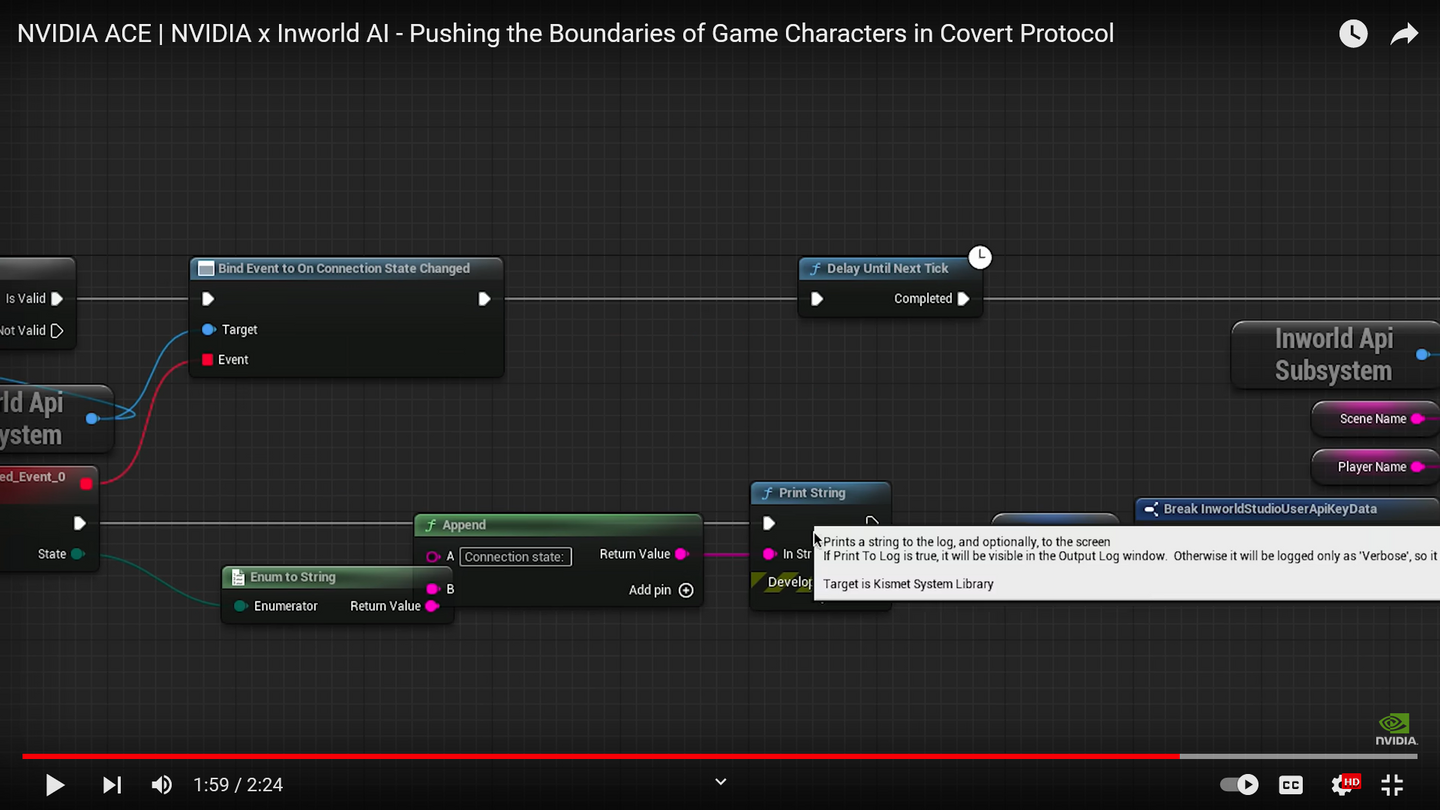
I hear no open invitation to the creative disciplines within game development, to the writers, artists and voice actors who cannot code, who have spent their careers developing organic creative skills rather than hard tech skills. There is no doubt that this technology will impact our craft, our livelihoods, yet every impression is given that Inworld's tool has been designed for developers. I do not wish to diminish the essential humanity of game developers, yet I must point out that writers, artists, actors and directors have devoted their careers to the study of humanity. It is we who have the experience and bandwidth to challenge unhealthy characterisation tropes in our industry. Even the slider behaviour control system appears daunting to use for one who has trained themselves in right-brain creative processes rather than left-brain analytical processes. Are Inworld's AI NPCs truly accessible to the creatives who can carefully consider this tool within the exploration of the human condition? By design, are we creatives being invited to contribute or are we being bypassed? I don't yet know the answer to that question. Perhaps, if the Covert Protocol demo becomes accessible to a narrative designer like me, I will be able settle this disconcerting mystery.
Conclusion:
The caveat here is that I only have Inworld AI's video and GeForce's article from which to draw my conjectures and conclusions. That said, even from what little I could glean, there is more that I find troubling than inspiring. I see more opportunities for game developers to bypass the creative process than I see for storytelling creatives to be empowered. More shall be revealed as Inworld rolls out its full demo. For now I remain deeply concerned by this technology's potential impact on interactive storytelling in video games.
If you would like to read more about my exploration of AI's effects on the creative process, you might be interested in this article about my experiments with ChatGPT4 and SudoWrite.
To see the NVIDIA and Inworld AI source article and videos, click here.
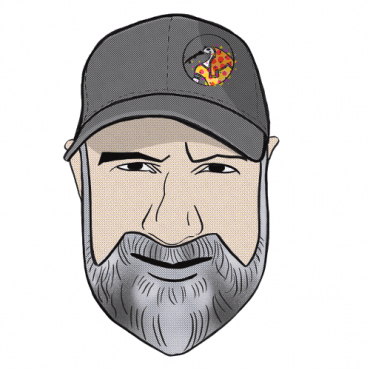
About Edwin McRae
Edwin is a narrative consultant and mentor for the games industry.
